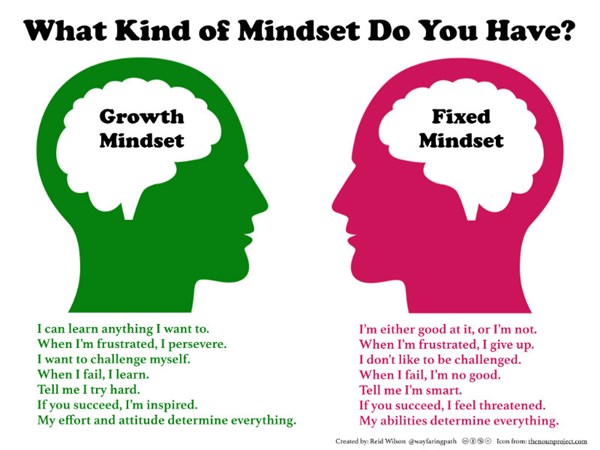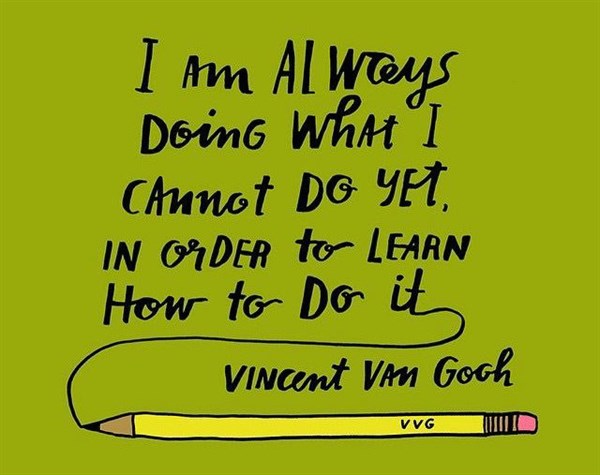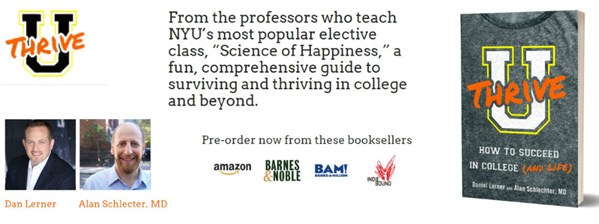Mindsets: how to maximise your mental potential
18 Apr 2017 | Daniel Lerner
The following is an excerpt from
Dan Lerner and Alan Schlechter's new book U
Thrive, a comprehensive guide to surviving and
thriving in college and beyond.

"A mind that is stretched by a
new experience can never go back to its old dimensions" ~ Oliver
Wendell Holmes
Running a mile in under four minutes was supposed to be
impossible.
In 1954, the conventional wisdom was that our muscles, tendons,
and bones were incapable of sustaining the pace necessary for such
a feat.
But British runner Roger Bannister wasn't conventional. He
believed differently, and on May 6, 1954, became the first human
being to break the four-minute barrier, running the mile in three
minutes and 59.4 seconds. It was an incredible accomplishment, but
it wasn't the end of this story.
Only one month after Bannister's landmark effort, the record was
broken again. Within a year, the record was broken four more times,
and as of 2016, a sub-four-minute mile has been achieved more than
five thousand times.
It wasn't physical capabilities that constrained runners before
Bannister, it was the mental ceiling they kept hitting. Like so
many limits, the four-minute barrier was all in the mind.
Once that barrier was broken, the imagination of what was
possible for the human body was forever altered - not just for
Bannister, but also for those who followed him.
Bannister didn't just break a record, he shattered a
mindset.

Mind Games: Challenging Our
Limitations
While some of us may not have had a mindset regarding the human
capacity to run swiftly, there are mindsets that many of us share.
A mindset is any firmly held belief about our qualities or what we
are capable of, physically, intellectually, or in any other sense
imaginable.
It is determined by every experience we have ever had: our
accomplishments and failures in kindergarten, how our parents
praised and punished us, and relationships that brought us agony or
ecstasy - every experience that taught us about our limits, or lack
of them.
Our mindsets are often called implicit, meaning we are rarely
aware of how they were formed and believe in them as truth
everlasting. That is, until we bring our attention to them. Your
mindset about mindsets is being built as you read these very
words!
Our mindsets affect the decisions we make, how we understand our
personalities, our relationships, our intelligence, and even the
classes we take and the internships we apply for. They dictate our
potential for change, motivation, behavior, learning style,
performance, and potential.
Some mindsets provoke a lot of debate (e.g., does life begin at
conception or at birth?), but it is the ones that are rarely
questioned or contemplated that we will focus on here.
As important as your mindsets are, it can be tough to step back
far enough to gain proper perspective to recognize their role in
your life. As with the people who didn't believe the four-minute
mile was possible, sometimes your mindset can blind you to your
true potential.
With the right kind of knowledge and a bit of
practice, you can learn to step back from your mindsets, evaluate
them, and, as your awareness increases, alter them to maximize your
potential to thrive.
You can develop mindsets to help you slay challenging
courses, recover from a bad breakup, or steer out of any other skid
in the road that is uniquely yours. The mindsets you establish now
open you up to all the extraordinary people, ideas, and experiences
that are available in college, building not just knowledge but a
deeper understanding of the "real world" you're on the verge of
stepping into.

Fixed vs. Growth Mindsets
For Stanford University's Carol Dweck, there are two essential
types of mindsets: a fixed mindset and
a growth mindset.
If you have ever been told (or perhaps have said), "I can't
change that, it's just the way I am", you have encountered a fixed
mindset. If someone can't change whatever "that" is (attitude,
ability, belief, you name it), what's the point of trying? None.
Drop the mike, conversation over.
If we don't believe we can change, there's no reason to try.
Feedback? No thank you. Tutors? Waste of pizza money. If the grades
aren't good now, they never will be. When someone with a fixed
mindset bombs a test, their effort (and often interest) in the
class drops with it. Even when they do well, it is often not
enough.
During college, Alan couldn't look himself in the mirror if he
had less than a perfect grade which, quite often, he did not. He
spent a lot of time feeling disappointed. In his senior year, his
dream finally came true when a biology exam came back with a score
of 105. Better than perfect! Rejoice!
But then he saw that there had been a 20-point curve, and his
immediate thought was: "I could have gotten a 120." He quickly
threw the test away, but even eight years before becoming a
psychiatrist, Alan knew that something was wrong with his
reaction.
People with growth mindsets are the opposite. Regardless of
their results, they are always looking for ways to improve. Smack a
student with a growth mindset in the face with a paper full of red
ink and they'll respond with a tsunami of effort and tenacity.
For people with growth mindsets, a loss is a lesson and a bad
grade on a paper is a fine opportunity to practice revision skills.
Feedback? Bring it. Challenges? The bigger the better. When you
know that you can change, that you can learn, and that you can
improve, every challenge is an opportunity.

Given the differences between the two mindsets, it's not hard to
figure out that a student with a growth mindset is more likely to
thrive, whereas a student with a fixed mindset is going to live in
survival mode.
Before you despair at having a fixed mindset, however, it's
important to remember that mindsets are rarely all-encompassing.
You may see yourself as having a fixed mindset in class ("I can't
get any smarter") but having a growth mindset in relationships ("I
am really inspired by how she pushes my boundaries").
Most importantly, mindsets change.
By the time Alan reached medical school, his mindset had been
altered significantly. On his very first exam, the passing grade
was a 67, and Alan received a 67.5 along with a handwritten note by
the professor: "You may have passed this exam, but you do not know
the material."
Alan fought his instinct to crumple up the blue book and
browbeat himself, instead searching out a TA so he could learn
where he had screwed up and figure out how to be better prepared
for his next test. Perfection was no longer the be-all and
end-all.
Progress, it turned out, was just as valuable, if not more
so.

U
Thrive is a fun, comprehensive guide to surviving and
thriving in college and beyond.
Daniel
Lerner is a speaker, teacher, strengths-based performance
coach, and an expert in positive and performance psychologies. In
the classroom and in his talks, Lerner integrates storytelling,
humor, and science, helping students and professionals apply his
teachings into their lives with immediate benefit.